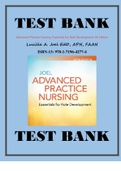Exam (elaborations)
Advanced Practice Nursing: Essentials for Role Development 5th Edition Lucille A. Joel EdD, APN, FAAN ISBN-13: 978-1-7196-4277-4
- Course
- Institution
- Book
Advanced Practice Nursing: Essentials for Role Development 5th Edition Lucille A. Joel EdD, APN, FAAN ISBN-13: 978-1-7196-4277-4 I. The Evolution of Advanced Practice 1. Advanced Practice Nursing: Doing What Has to Be Done (Lynne M. Dunphy) 2. Emerging Roles of the Advanced Practice Nurse (Patri...
[Show more]



